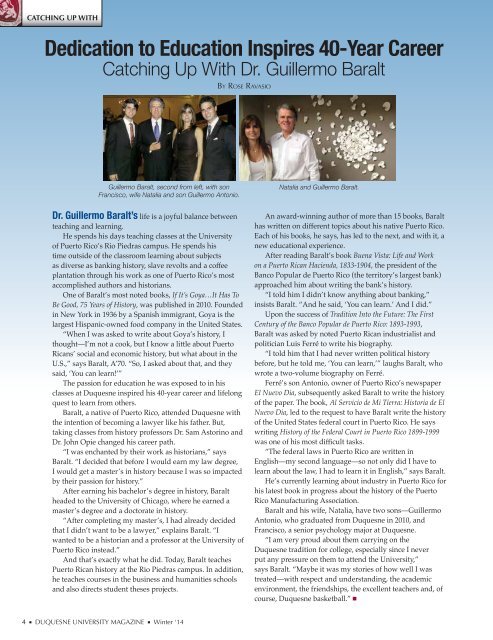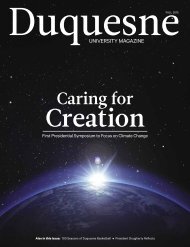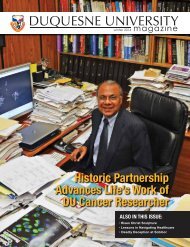2014-Winter-DU-Magazine
2014-Winter-DU-Magazine
2014-Winter-DU-Magazine
Create successful ePaper yourself
Turn your PDF publications into a flip-book with our unique Google optimized e-Paper software.
CATCHING UP WITH<br />
Dedication to Education Inspires 40-Year Career<br />
Catching Up With Dr. Guillermo Baralt<br />
By Rose Ravasio<br />
Guillermo Baralt, second from left, with son<br />
Francisco, wife Natalia and son Guillermo Antonio.<br />
Natalia and Guillermo Baralt.<br />
Dr. Guillermo Baralt’s life is a joyful balance between<br />
teaching and learning.<br />
He spends his days teaching classes at the University<br />
of Puerto Rico’s Rio Piedras campus. He spends his<br />
time outside of the classroom learning about subjects<br />
as diverse as banking history, slave revolts and a coffee<br />
plantation through his work as one of Puerto Rico’s most<br />
accomplished authors and historians.<br />
One of Baralt’s most noted books, If It’s Goya…It Has To<br />
Be Good, 75 Years of History, was published in 2010. Founded<br />
in New York in 1936 by a Spanish immigrant, Goya is the<br />
largest Hispanic-owned food company in the United States.<br />
“When I was asked to write about Goya’s history, I<br />
thought—I’m not a cook, but I know a little about Puerto<br />
Ricans’ social and economic history, but what about in the<br />
U.S.,” says Baralt, A’70. “So, I asked about that, and they<br />
said, ‘You can learn!’”<br />
The passion for education he was exposed to in his<br />
classes at Duquesne inspired his 40-year career and lifelong<br />
quest to learn from others.<br />
Baralt, a native of Puerto Rico, attended Duquesne with<br />
the intention of becoming a lawyer like his father. But,<br />
taking classes from history professors Dr. Sam Astorino and<br />
Dr. John Opie changed his career path.<br />
“I was enchanted by their work as historians,” says<br />
Baralt. “I decided that before I would earn my law degree,<br />
I would get a master’s in history because I was so impacted<br />
by their passion for history.”<br />
After earning his bachelor’s degree in history, Baralt<br />
headed to the University of Chicago, where he earned a<br />
master’s degree and a doctorate in history.<br />
“After completing my master’s, I had already decided<br />
that I didn’t want to be a lawyer,” explains Baralt. “I<br />
wanted to be a historian and a professor at the University of<br />
Puerto Rico instead.”<br />
And that’s exactly what he did. Today, Baralt teaches<br />
Puerto Rican history at the Rio Piedras campus. In addition,<br />
he teaches courses in the business and humanities schools<br />
and also directs student theses projects.<br />
An award-winning author of more than 15 books, Baralt<br />
has written on different topics about his native Puerto Rico.<br />
Each of his books, he says, has led to the next, and with it, a<br />
new educational experience.<br />
After reading Baralt’s book Buena Vista: Life and Work<br />
on a Puerto Rican Hacienda, 1833-1904, the president of the<br />
Banco Popular de Puerto Rico (the territory’s largest bank)<br />
approached him about writing the bank’s history.<br />
“I told him I didn’t know anything about banking,”<br />
insists Baralt. “And he said, ‘You can learn.’ And I did.”<br />
Upon the success of Tradition Into the Future: The First<br />
Century of the Banco Popular de Puerto Rico: 1893-1993,<br />
Baralt was asked by noted Puerto Rican industrialist and<br />
politician Luis Ferré to write his biography.<br />
“I told him that I had never written political history<br />
before, but he told me, ‘You can learn,’” laughs Baralt, who<br />
wrote a two-volume biography on Ferré.<br />
Ferré’s son Antonio, owner of Puerto Rico’s newspaper<br />
El Nuevo Dia, subsequently asked Baralt to write the history<br />
of the paper. The book, Al Servicio de Mi Tierra: Historia de El<br />
Nuevo Dia, led to the request to have Baralt write the history<br />
of the United States federal court in Puerto Rico. He says<br />
writing History of the Federal Court in Puerto Rico 1899-1999<br />
was one of his most difficult tasks.<br />
“The federal laws in Puerto Rico are written in<br />
English—my second language—so not only did I have to<br />
learn about the law, I had to learn it in English,” says Baralt.<br />
He’s currently learning about industry in Puerto Rico for<br />
his latest book in progress about the history of the Puerto<br />
Rico Manufacturing Association.<br />
Baralt and his wife, Natalia, have two sons—Guillermo<br />
Antonio, who graduated from Duquesne in 2010, and<br />
Francisco, a senior psychology major at Duquesne.<br />
“I am very proud about them carrying on the<br />
Duquesne tradition for college, especially since I never<br />
put any pressure on them to attend the University,”<br />
says Baralt. “Maybe it was my stories of how well I was<br />
treated—with respect and understanding, the academic<br />
environment, the friendships, the excellent teachers and, of<br />
course, Duquesne basketball.”<br />
4 <strong>DU</strong>QUESNE UNIVERSITY MAGAZINE <strong>Winter</strong> ‘14




